
Sustainable Project of the Year
This category highlights AEC projects implementing environmental, social, and governance (ESG) principles have been embedded into one of more projects. The project must be complete or have finished a major phase in the past 24 months. Entries should show various ESG factors such as eco-friendly design, sustainable materials use, emission reduction processes, social initiatives like equality and health, and governance practices like transparency and fair compensation. Eligible entrants included contractors, consultants, developers, and project owners in the built environment.
2024 DP World Tour Golf Championship
Al Laith Group
DP World Tour wished to showcase innovative sustainability initiatives, and Al Laith contributed by delivering key ESG solutions as part of the planning, design and construction of the championship venue. These included energy-efficient electric machinery, solar-powered lighting, modular water-saving sanitation and drinking systems, and the use of recycled PET acoustic panels in place of traditional ply wood during the construction phase.
Al Laith used electric, IoT enabled machinery as well as supplied solar powered temporary lighting for all car parks, walkways and public areas resulting in more efficient power usage as well as eco friendly LED lights which do less harm on the eyes and the environment.
Al Laith eliminated single-use plastics by deploying refillable fixed water stations around the venue, as well as deployed mobile water stations, (in collaboration with No More Bottles) which provided the sporting public with a convenient way to refill their drinking containers. The Al Laith vacuum toilet systems, which are unique to the region use a waterless sanitation system resulting in a reduction in traditional water usage which further enhanced the project's water conservation efforts.
Al Laith replaced all traditional wood carpentry products with recycled PET palm tree compressed plywood.
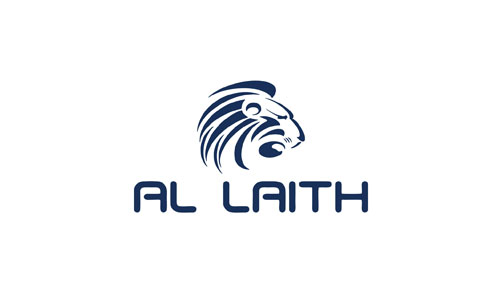
Athlon by Aldar
Parsons
Aldar Athlon is a development that spans around 1,000,000 m² (100 hectares). This upscale residential community integrates innovative design with environmental and social sustainability.
The project is a primarily designed to promote an active lifestyle for its residents. The project has achieved LEED Cities and Communities - Platinum Rating, and Fitwel for Sites: Community - 2 Star Rating, demonstrating its commitment to health, well-being, and resilience.
Strategically located inland of Dubai, Athlon is 22 minutes from Downtown, nestled between the E311-E611 major highways and surrounded by Arabian Ranches 3. Direct road access ensures excellent connectivity, making it a prime location for future residential and commercial growth.
From inception, Athlon was designed as an integrated and future-ready community, prioritising climate adaptation, carbon reduction, and resource efficiency. The project employs low-impact development strategies to minimise environmental impact while enhancing energy, water, and waste efficiency, leading to long-term cost savings.
A Resilience Plan and Vulnerability Assessment guided infrastructure design to withstand natural and man-made hazards. By blending sustainability, well-being, and smart design, Athlon by Aldar sets a benchmark for responsible urban development, fostering a resilient, liveable, and thriving community for generations to come.
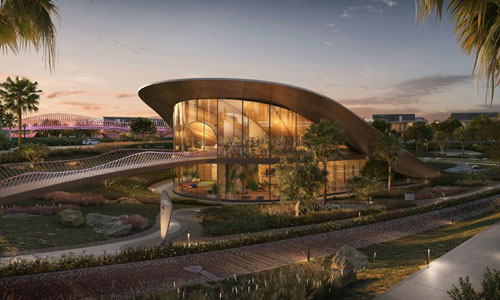
Warsan Waste Management Centre
Dubai Municipality
The new Waste-to-Energy Centre in Warsan takes Dubai another step closer to achieving its strategy to become the world’s most sustainable ecosystem. Developed through public-private partnership strategy, the Centre is the largest and most efficient waste-to-energy conversion facility in the world.
The Centre has the capacity to treat around 2 million tonnes (equivalent to waste generated by 3 million people) of solid waste annually to generate power equivalent to power requirements of 135,000 homes.
As the Centre is co-located with the Warsan Sewage Treatment Plant (STP), the power for operations of the STP in excess from what the STP self-generates from biogas, will come from the Centre. This makes the Warsan STP the largest STP in the region that is operated from sustainable energy source.
The Centre supports the overall strategy of reducing; reusing; recycling solid waste before final disposal.
The Centre plays a significant part in the reduction of demand of landfill space in a rapidly developing city like Dubai.
This ambitious project shows our profound commitment to the Dubai Master Waste Management Plan 2021-2041 and to creating a cleaner, greener sustainable city.
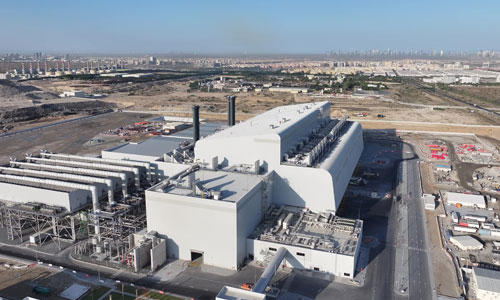
Building Retrofit & Solar PV Project
Dubai Municipality
Dubai Municipality's ongoing efforts in building retrofit and solar PV installation projects continued to make a significant impact in 2024, contributing to both energy savings and sustainability goals. Below are the key highlights of the projects:
- Over 600 facilities have been included in the Retrofit and Solar PV installation projects, reflecting Dubai Municipality’s commitment to enhancing energy efficiency across a wide range of buildings and infrastructure.
- Some facilities have successfully achieved Net Zero Energy Building status, incorporating advanced energy-efficient technologies and practices.
- Several facilities are also aligned with the ISO 50001 Energy Management System, which ensures a structured and systematic approach to energy management.
The success of these projects has been acknowledged with prestigious awards, highlighting the innovative approaches and tangible results achieved.
The total energy savings estimated through these efforts amount to an impressive 500 million kWh, demonstrating the scale and effectiveness of these initiatives in reducing energy consumption and supporting sustainability objectives.
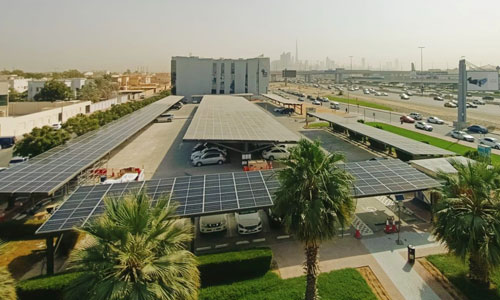
Qurain Mosque
Saudi Diyar Consultants
The Qurain Mosque in Diriyah, Saudi Arabia, is designed to be a landmark of sustainable religious architecture, integrating LEED New Construction and Mostadam certification to ensure environmental responsibility, social inclusivity, and governance excellence.
Diriyah’s rich cultural and historical significance is reflected in the mosque’s design, which harmonises traditional Islamic architecture with modern sustainability standards.
By deploying Environmental, Social, and Governance strategies, the project contributes to Saudi Vision 2030 objectives for sustainable urban development, setting an eco-friendly religious space in the region.
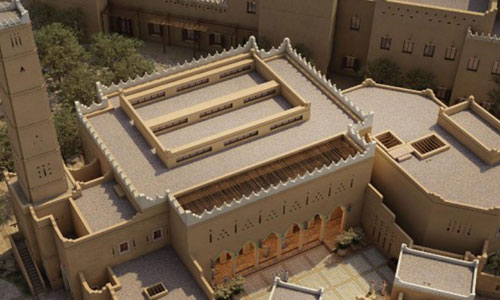
SAFA TWO
DAMAC Properties
The SAFA TWO project, located in Dubai's Business Bay, is a luxury residential skyscraper developed by DAMAC Properties in collaboration with the renowned Swiss jeweller de Grisogono. The 85-story building is designed to resemble a cut diamond and features a ruby-shaped construction in the middle of the facade.
Some of its unique features include:
- A floating infinity pool with transparent edges in the middle of the skyscraper.
- A grand lobby marked by diamond and ruby elements.
- An indoor fog forest, an observatory, and terraces overlooking panoramic views of the city on the rooftop.
- Apartments with movable walls and Murphy beds that allow the bedrooms to be transformed into office spaces.
- Sliding bars with mirrors that can enable residents to modify living rooms for a party room.
DAMAC Properties, as a leading real estate developer in the region, is likely to have incorporated sustainable practices in the project's design and construction. These practices include:
- Energy-efficient building materials and systems.
- Water conservation measures.
- Waste management and recycling programs.
- Green spaces and landscaping.
- Community engagement and social responsibility initiatives.
The stated aims in deploying ESG approaches in real estate projects typically include:
- Reducing environmental impact.
- Creating sustainable and livable communities.
- Enhancing social well-being.
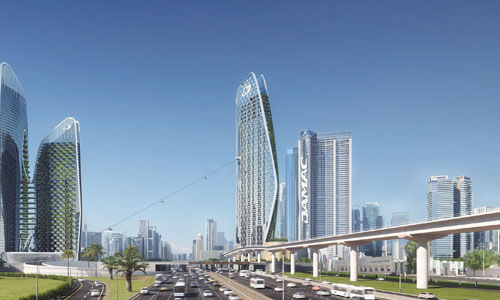
The Sustainable City Yiti
Sustainable Development & Investment Company
The project is designed to improve the quality of life for residents without compromising the needs of future generations.
The Sustainable City Yiti stands as a symbol of urbanisation and sustainability in the Sultanate of Oman. Located in the capital city of Muscat along the serene waters of the Arabian Sea, this upcoming sustainable destination is distinguished by its rich environmental diversity, unique sustainable experiences and promising opportunities.
The Sustainable City - Yiti aims to be net zero carbon by 2040 in line with Oman’s sustainability goals. By keeping people at its heart, the city’s strength of community spirit endures as we come together with our residents to lead the change towards a brighter tomorrow.
Using clean energy, water and waste recycling, food production, clean mobility, and better air quality, which will contribute to the following Sustainable Development Goals (SDG):
- SDG 3: Good Health & Well-being
- SDG 5: Quality Education
- SDG 6: Clean Water and Sanitation
- SDG 7: Affordable and Clean Energy
- SDG 11: Sustainable Cities and Communities
- SDG 13: Climate Action
- SDG 14: Life below water
- SDG 15: Life on Land
- SDG 17: Partnership for the Goals.
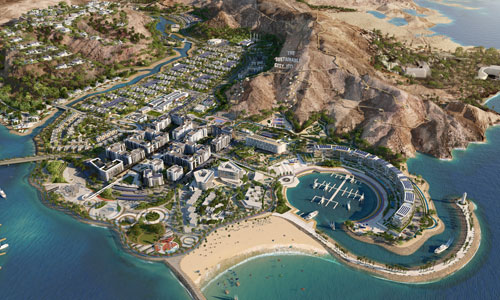
Yas Acres Development Precinct E & F
Trojan Construction Group
The Yas Acres Villa project, located in Yas Island, Abu Dhabi, is a pioneering development that showcases advanced sustainability principles in the built environment. Developed by Aldar and executed by Trojan Construction Group, this landmark project incorporates Environmental, Social, and Governance (ESG) initiatives at every stage of design, procurement, and construction. The project is committed to reducing carbon emissions, enhancing resource efficiency, and promoting community well-being.
From an environmental perspective, the project integrates high-performance building envelopes, energy-efficient HVAC systems, and solar-ready infrastructure to reduce its carbon footprint. Additionally, it prioritises the use of low-carbon, sustainable construction materials and implements water conservation measures such as smart irrigation systems.
Social sustainability is a key focus, with initiatives aimed at workforce welfare, occupational health and safety, and the creation of inclusive, well-designed spaces that enhance residents’ quality of life. Governance measures ensure ethical sourcing of materials, transparent project execution, and compliance with global sustainability frameworks.
Aligned with the UAE’s Net Zero 2050 Strategy, Yas Acres Villa is a model for ESG-driven construction, demonstrating how innovative design, responsible material selection, and advanced digital monitoring can create a more sustainable and resilient built environment.
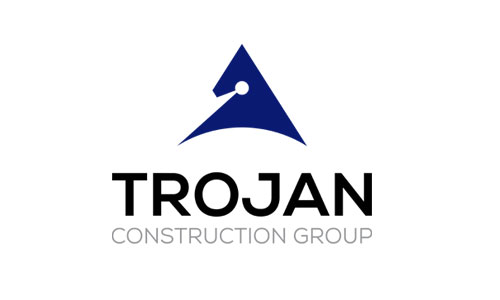
Just Say Hi there!